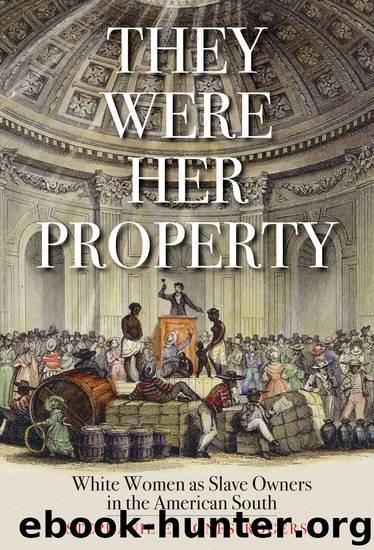They Were Her Property: White Women as Slave Owners in the American South by Stephanie E. Jones-Rogers

Author:Stephanie E. Jones-Rogers [Jones-Rogers, Stephanie E.]
Language: eng
Format: epub
Tags: History, United States, State & Local, South (AL; AR; FL; GA; KY; LA; MS; NC; SC; TN; VA; WV), Social Science, Women's Studies, Slavery
ISBN: 9780300218664
Google: iB-FDwAAQBAJ
Amazon: 0300218664
Publisher: Yale University Press
Published: 2019-02-19T00:00:00+00:00
The women who bought and sold enslaved people for personal use, sold enslaved people on behalf of others, engaged in slave speculation, and partnered with others to trade in slaves for profit were not the only women navigating southern slave markets. Slave-owning women who set enslaved women to work in their “negro brothels” also benefited from their engagement in slave-market activities, and their livelihoods brought the markets in slaves and sex together. Some historians have assumed that “white men’s sexual access to slave women . . . lessened the market for black prostitutes,” and other scholars who examine the fancy trade—the sector of the market that catered to white men who sought to purchase sexual slaves and concubines—position them as the only individuals who seized the economic opportunities that such a market presented. But this was not always the case, especially in cities like New Orleans.87
Nineteenth-century New Orleans was one of the most important port cities in the world. It also held the largest slave market in the South, and it had plenty of brothels and prostitutes.88 Historians have studied the city’s slave market and fancy trade, including slave traders’ sales of these enslaved women to individuals who operated southern brothels, as well as the relationship between prostitution, city politics, and economic growth.89 These discussions usually center on male actors. But even a cursory glance at newspaper reports of arrests for crimes related to prostitution and brothel keeping makes it clear that women constituted the majority of the accused. And stories about white women who benefited from their involvement in the city’s markets in slaves and sex offer a dramatically different view of the ways white women exploited enslaved bodies for profit.
In what the New Orleans Daily Picayune described as a “disgusting affair,” police arrested four “light colored” enslaved women on the charge of living in a “house of ill-fame.” They belonged to Mathilda Raymond, the keeper of the house. According to the Picayune, these women were not simply Raymond’s domestic servants; they were in her house for “the vilest purposes”—in other words, to engage in prostitution. Raymond’s neighbor Thomas Lynch accused her of “keeping a disorderly house” that was “the resort and residence of lewd and abandoned women.” He did not, however, mention that some of these so-called lewd and abandoned women were enslaved.90
Mary Taylor also operated what the local newspaper described as a “negro brothel” in New Orleans, and she owned at least four women who were employed there. In 1855, three of them—Margaret, Patsey, and Josephine—were arrested on the charge of keeping a disorderly brothel, which was probably Taylor’s establishment. In 1858, they, along with another of Taylor’s slaves named Theresa and several enslaved people who belonged to local residents, were brought before court officials for unlawful assembly and harboring runaway slaves in Taylor’s brothel. And in 1862, two of her female slaves were charged with conspiring with Taylor to “rope in” and rob a man, probably a client. Taylor and her two female slaves were subsequently arrested, seized by the police, and placed in the local jail.
Download
This site does not store any files on its server. We only index and link to content provided by other sites. Please contact the content providers to delete copyright contents if any and email us, we'll remove relevant links or contents immediately.
| General | Discrimination & Racism |
Nudge - Improving Decisions about Health, Wealth, and Happiness by Thaler Sunstein(7693)
The Fire Next Time by James Baldwin(5431)
iGen by Jean M. Twenge(5409)
Adulting by Kelly Williams Brown(4566)
The Sports Rules Book by Human Kinetics(4379)
The Hacking of the American Mind by Robert H. Lustig(4375)
The Ethical Slut by Janet W. Hardy(4242)
Captivate by Vanessa Van Edwards(3838)
Mummy Knew by Lisa James(3686)
In a Sunburned Country by Bill Bryson(3537)
The Worm at the Core by Sheldon Solomon(3486)
Ants Among Elephants by Sujatha Gidla(3463)
The 48 laws of power by Robert Greene & Joost Elffers(3251)
Suicide: A Study in Sociology by Emile Durkheim(3019)
The Slow Fix: Solve Problems, Work Smarter, and Live Better In a World Addicted to Speed by Carl Honore(3007)
The Tipping Point by Malcolm Gladwell(2914)
Humans of New York by Brandon Stanton(2868)
Handbook of Forensic Sociology and Psychology by Stephen J. Morewitz & Mark L. Goldstein(2704)
The Happy Hooker by Xaviera Hollander(2686)
